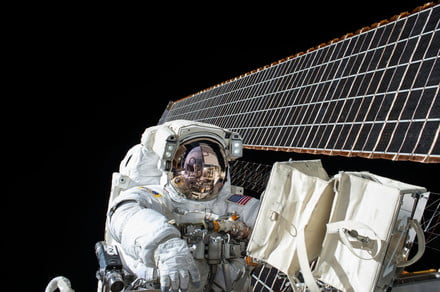Scott Kelly at work on ISS maintenance with the station’s solar arrays visible in the background. NASA
What exactly happens to a human body in space? Despite decades of astronauts going on space missions, this question remains hard to answer. The problem is that there is a great deal of individual variation between humans, so everyone’s body is different. This makes it hard to compare the physiological effects of space travel between astronauts and those of us who stay on Earth.
But now a new NASA study has revealed clues about the effects of space by studying a pair of twins. Two retired astronauts, twin brothers Scott and Mark Kelly, lent their bodies to science to be studied for a period between 2015 and 2016. During this time, Mark stayed on Earth while Scott spent 340 days aboard the International Space Station (ISS). Scientists were able to compare how their two bodies responded over that time, without confounding factors of genetics and large individual differences.
The NASA researchers studied factors like gene expression changes, immune systems responses, and cognitive functioning. One significant finding was that spending time in space seems to effect aging. Scott had changes to his DNA, showing longer telomeres — the caps at the end of a DNA strand. When compared to his brother’s teleomeres, Scott’s telomeres were longer while he was in space and then shorter after his return to Earth, eventually returning to normal after six months.
Another finding was the way in which Scott’s genes expressed. Gene expression is part of the way that genes interact with an environment, and it was found that Scott’s genes expressed differently in space. His genes mostly returned to normal after he returned to Earth, but a few genes seemed to be permanently altered by time spent in space. The effected genes included those related to the functioning of the immune system and DNA repair.
“A number of physiological and cellular changes take place during spaceflight,” Jennifer Fogarty, chief scientist of the Human Research Program at NASA’s Johnson Space Center in Houston, said in a statement. “We have only scratched the surface of knowledge about the body in space. The Twins Study gave us the first integrated molecular view into genetic changes, and demonstrated how a human body adapts and remains robust and resilient even after spending nearly a year aboard the International Space Station. The data captured from integrated investigations like the NASA Twins Study will be explored for years to come.”
Full results of the study are published in the journal Science.
Editors’ Recommendations
- Microbes survive outside the International Space Station, might do same on Mars
- 3-plus-hour supply trip from Earth to International Space Station breaks record
- A silver bullet is being aimed at the drug-resistant superbugs on the ISS
- SpaceX’s Crew Dragon craft splashes down safely in the Atlantic Ocean
- Space debris from India’s anti-satellite missile test a threat to ISS, NASA says

